A New Puppy Owner’s Guide to Caring for a Wolf Dog
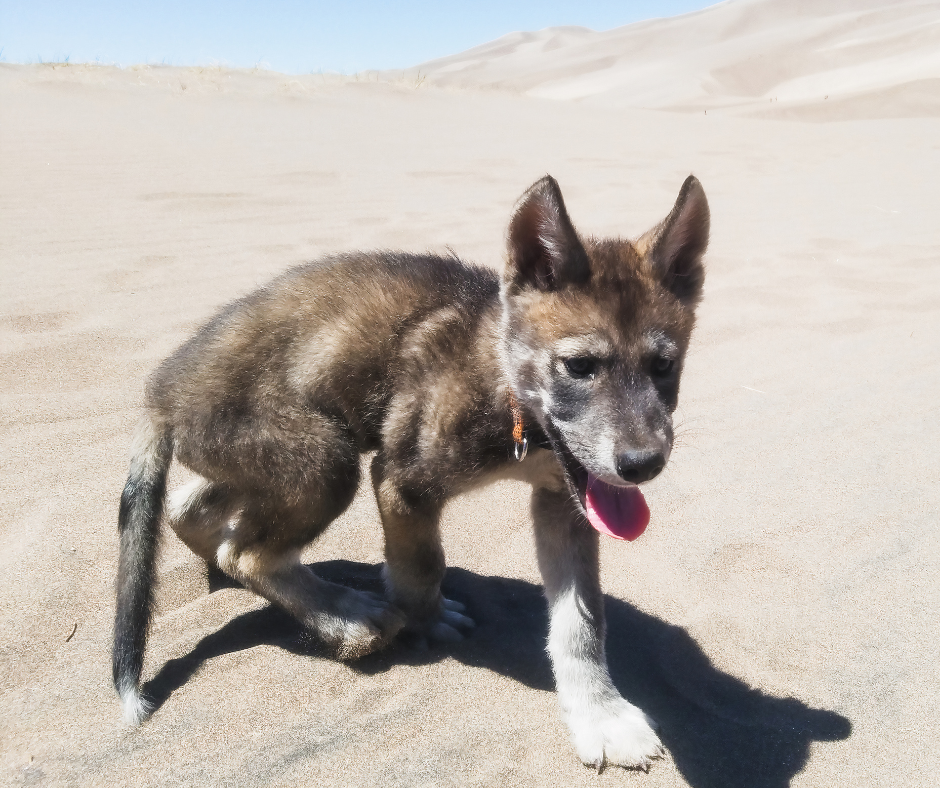
Wolf hybrid puppies are full of energy and curiosity If you’ve just brought a wolf hybrid puppy into your home, you’re in for a lot of fun and adventure! However, it is important to be prepared for the challenges that come with owning a wolf dog. One of the biggest challenges is getting through the puppy phase. These hybrids are incredibly intelligent and loving animals, but they do require a lot of care.
In this article, we will discuss everything you need to know about raising and caring for your wolf dog puppy. We’ll talk about introducing him to your home, providing proper exercise and mental stimulation, socializing him with other animals and people, training him basic commands, and what to feed him. By the end of this guide, you will be an expert in caring for your new furry friend.
Table of Contents
ToggleIntroducing a New Wolf Dog Puppy to Your Home
Bringing a new wolf dog puppy into your home is an exciting, but sometimes overwhelming experience. It will change the dynamic of your family. Here are some tips for successfully integrating your new wolf dog into your home.
Prepare your home
The first thing you need to do is make sure your house is safe for your new wolf hybrid puppy. You’ll need to do a few things to puppy-proof your home. Move any toxic plants out of reach, pick up any small objects they could choke on, and put away anything they could damage with their teeth. You should also make sure your trash cans have tight-fitting lids, as many puppies are curious about what’s inside and will help themselves if given the chance.
Create a special space
Set up puppy pads in a puppy-proofed room with everything he needs: bedding, crate, toys, food, and water. This will be his safe space where he can go to relax and feel comfortable.
Introduce Them Carefully
When you first bring your wolf dog puppy home, take things slowly. Allow them to sniff around and get comfortable with their new surroundings before picking them up or trying to pet them. Once they seem relaxed, you can start slowly introducing them to the other members of your family.
Tips for Preparing Your Yard For a Wolf Dog Puppy
Preparing your yard or outdoor enclosure for a wolf hybrid puppy is an essential part of bringing one of these beautiful animals into your home. By taking the time to do things like install a fence, provide enrichment, and create shady spots for them to cool off in, you’ll be giving your pup the best possible start in life.
Sufficient Fencing/Enclosure
One of the most important things you’ll need to do to prep your yard for a wolf hybrid is to install a fence. A proper enclosure is important for keeping your wolf hybrid puppy safe when they’re not supervised. A 6-foot tall fence is typically sufficient, but taller is always better when it comes to containing these powerful pups. You’ll also want to make sure the fence is buried at least 18 inches underground to deter digging. And lastly, be sure the fence has no gaps or holes that your pup could squeeze through.
How Big Should An Outdoor Enclosure Be For A Wolfdog?
Ideally, wolfdogs should have access to an outdoor containment that is at least 1/2 acre in size. This will give them plenty of room to roam and explore, while still providing a safe and secure space.
Set an Area For Digging
One of the most important things you can do to prepare for your new wolf hybrid puppy is to set aside an area where they can dig safely. This will save you a lot of frustration later on down the road, as digging is one of the most common behaviors puppies engage in. If you provide them with an area where it’s okay for them to dig, they’ll be less likely to try digging in other places where it’s not okay (like your flower beds). The best way to set up a digging area is to fill a sandbox with sand or dirt, or create a small garden bed filled with loose soil.
Shade and Shelter
Since wolf dogs are part of the canine family, they are susceptible to heatstroke and sunburn. To protect them from the elements, be sure to provide plenty of shade and shelter in their outdoor space. This can be in the form of trees, dog houses, or even just umbrellas or tarps.
Enrichment
In the wild, wolves roam vast distances and hunt for their food. To keep your wolf hybrid happy and healthy, you’ll need to provide them with plenty of enrichment in their outdoor space. This can include anything from hiding food around the yard for them to find, to installing a doggy door so they can come and go as they please. You can also get creative with toys and games – anything that will help keep their minds active and engaged.
Training Your Wolf Dog Puppy
It is important to start training early and to be consistent with your commands. Since wolf hybrids are part wild, they can be more difficult to train than a typical domestic dog. The foundation of all training is building a strong bond of trust and respect between you and your wolf dog puppy. This bond will make it easier for your wolf dog puppy to learn commands and tricks, and will make training sessions more enjoyable for both of you. Here are a few tips to help you build that bond:
Establish Yourself As The Alpha
Wolfdogs are pack animals, so they need to know who the leader of the pack is. You need to be firm but fair with your wolfdog; set rules and boundaries, and enforce them consistently. This will help your wolfdog feel secure and know what is expected of them.
Spend time with your wolf dog puppy every day
Take him or her for walks, play games together, and just spend time cuddling on the couch. The more time you spend together, the stronger your bond will be.
Be consistent with your rules and commands
If you tell your wolf dog puppy “no” one day and then let him get away with the same behavior the next day, he’ll quickly become confused and frustrated. By being consistent, you’ll help your wolf dog puppy understand what is expected of him.
Use positive reinforcement whenever possible
Rewarding your wolf dog puppy with treats, praise, or petting when he does something you’ve asked him to do will help reinforce good behavior and make training more fun for both of you.
Begin with Obedience Training
Once you’ve built a strong bond with your wolf dog puppy, you can start working on obedience training. As with all training, obedience training should be started as early as possible. The sooner you start teaching your wolf dog puppy basic commands like “sit,” “stay,” and “come,” the better. Not only will this make life more pleasant for both of you in the long run, but it will also help keep your wolf dog puppy safe by giving you a way to control his behavior in potentially dangerous situations.
Leash Training
Leash training should be started as early as possible with a wolfdog puppy. It’s important to get them accustomed to wearing a leash and collar so that you can take them on walks and adventures without having to worry about them bolting away or getting lost.
You’ll want to start by letting your puppy wear the leash and collar around the house for short periods of time, gradually increasing the amount of time as they get used to it. Once they seem comfortable, you can begin taking them on short walks around the block, being sure to praise them lavishly whenever they walk calmly by your side.
In order to have the best possible experience when walking our wolf dog, we use a no pull harness. This type of harness provides us better control over our wolf dog and helps to prevent them from pulling.
For all of our tips and tricks for training a wolf dog, check out our detailed guide: How To Train A Wolf Dog: House Training, Socialization & Behavior
Why Socialization is Important for Wolf Dogs Puppies
If you’re the proud owner of a wolf dog puppy, you may have noticed that they can be a bit shy around people and other animals. While this is perfectly natural for wolf dogs, it’s important to socialize them early on so that they can learn to be comfortable around others. With a little patience and effort, you can socialize your wolf dog puppy and help them grow into a confident, well-adjusted adult.
How to Socialize Your Wolf Hybrid Puppy
Socialization is the process of exposure to different people, animals, and environments in order to make your puppy comfortable and confident in a variety of situations. It’s important to start socialization early, as puppies are most receptive to new experiences between the ages of 8 and 16 weeks.
Tips for socializing your wolf hybrid puppy:
Introduce them to as many people as possible — including children, seniors, and people with disabilities. This will help your puppy get used to being around all types of people and will make them more comfortable in a variety of situations.
Take them on walks in different neighborhoods — Introduce your wolf dog puppy to different sights, sounds, and smells. This will help your puppy become less fearful of new environments.
Have friends and family over to your house on a regular basis — your puppy needs to get used to having people in their space. This will help your puppy feel comfortable having visitors in their home.
Expose them to as many different experiences as possible — this includes car rides, swimming, hiking, camping, etc. The more experiences your puppy has, the more well-rounded and confident they will be.
How to Crate Train Your Wolf Hybrid Puppy
A wolf hybrid puppy is a unique pet that requires special care and training. One of the most important things you can do for your new puppy is to crate train them. Crate training will help your puppy feel comfortable and secure in their new home and will make house-training much easier.
Why Crate Train?
Crate training is a great way to help your puppy feel at home in their new environment and to teach them good house manners. A properly trained wolf hybrid puppy will be less likely to have accidents in the house and will be less destructive when left alone.
Crate training also allows you to provide your puppy with a safe place to stay when they are not being supervised. This is especially important for wolf hybrids, as they can have separation anxiety and be more destructive than other breeds of puppies.
Tips For Crate Training Your Wolfdog:
- Choose the right size crate – The crate should be big enough for your wolfdog to stand up, turn around, and lie down comfortably, but not so big that they can use one end as a bathroom and the other as a bed.
- Put the crate in a comfortable place – Place the crate in an area of the house where your wolfdog can see you and your family members moving around. This will help them feel less isolated and more comfortable in their crate.
- Introduce the crate gradually – Start by feeding your wolfdog their meals in their crate so that they associate it with something positive (food). Once they are comfortable eating in their crate, you can start confining them to it for short periods of time while you are home so that they can get used to being away from you.
- Take things slowly – Don’t try to confine your wolfdog to their crate for more than they can handle at first (e.g., if they start barking or whining). Slowly increase the amount of time they spend in their crate until they are comfortable staying in there for longer periods of time (up to 8 hours).
- Supervise when they are out of the crate – When you let your wolfdog out of their crate, make sure you are there to supervise them so that they don’t have an accident inside the house. If possible, take them outside immediately so that they can relieve themselves before coming back inside.
- Be patient – Crate training takes time and consistency. Don’t get discouraged if there are accidents or setbacks along the way! Just stay patient and keep at it – eventually your wolfdog will get the hang of it!
- Reward good behavior – Whenever your wolfdog uses the bathroom outside or behaves well while in their crate, be sure to give them lots of praise and treats (they love bully chews)! This will reinforce good behavior and help them learn what is expected of them.
Feeding Your Wolf Hybrid Puppy
As any dog owner knows, offering a nutritious diet to your dog is critical for their overall health. But did you know that the nutritional needs of domesticated dogs are actually quite different from those of their wild ancestors?
Wolf dogs and wolf hybrids are carnivorous animals and their digestive system is designed to process whole bones and raw meat based diets. These meat-based diets, also known as biologically appropriate raw food or BARF diets, typically consist of uncooked ingredients from either livestock or wild animals. Let’s take a look at the raw meat wolf hybrids and wolf dog puppies can eat.
Puppies must eat 4 meals each day until they are 12 weeks old, consuming a diet of ground beef or raw chicken wings, with eggs, goat yogurt, goat whip, and bones, feed your pup a diet high in fat for brain development. Once they reach 12 weeks old, they can be fed a more adult diet of 3-5 pounds of various meat or raw chicken leg quarters, depending on your animal’s appetite.
For more information about feeding your wolf dog, check out our in-depth guide: Best Diet for Wolf Dogs
Exercise for Wolf Dog Puppies
Wolf dogs are high-energy dogs. They need a lot of exercise to stay healthy and happy. A good rule of thumb is to exercise them for at least one hour per day. This can be in the form of walks, runs, hikes, or trips to the dog park. If you do not provide your pup with enough exercise, they may become destructive out of boredom.
Mental Stimulation for Wolf Dogs
In addition to physical exercise, wolf dogs also need mental stimulation. This can be in the form of puzzle toys, training classes, or nose work games. Puzzle toys are great because they keep your wolf dog’s mind active and engaged. Training classes are also beneficial because they teach your wolf dog obedience commands and socialization skills. Nose work games are perfect forwolf dogs because they use their natural scavenging instincts to search for treats or toys that are hidden around the house or yard.
Our Tips for Getting through the Wolf Dog Puppy Phase
Be prepared for potty accidents — Just like any other puppy, your wolf dog will have accidents in the house. It is important to be patient and consistent with training. Remember that it will take some time for your wolf dog to learn where he or she should go to the bathroom.
Be prepared to find things destroyed — Wolf dogs are notorious for being destructive during the puppy phase. They will chew on anything and everything they can get their teeth on, so it’s important to puppy-proof your home as much as possible. Keep valuables out of reach and put away anything that could be chewed up and swallowed. It’s also a good idea to invest in some durable toys that will withstand a lot of chewing.
Be prepared for your wolf to dog escape —Wolf dogs are also known for being escape artists, so it’s important to make sure your yard is secure. If possible, invest in a GPS collar so you can track your wolf dog if he does manage to get out. It’s also a good idea to keep an eye on him when he’s outside and not let him off leash in unsecured areas.
Raising A Wolf Dog Puppy Final Thoughts
Raising a wolf dog puppy takes patience, consistency, and lots of love—but it’s so worth it! If you are thinking about owning a pet wolf dog puppy, I hope this helped you understand the requirements necessary.
Just remember that all Wolf dogs need much more attention, patience, and training than any domestic dog. I do recommend you educate yourself thoroughly before deciding to have a wolfdog in your life.
If you have any questions, leave them in the comments below. For more resources, check out our other blog posts about wolf hybrids!

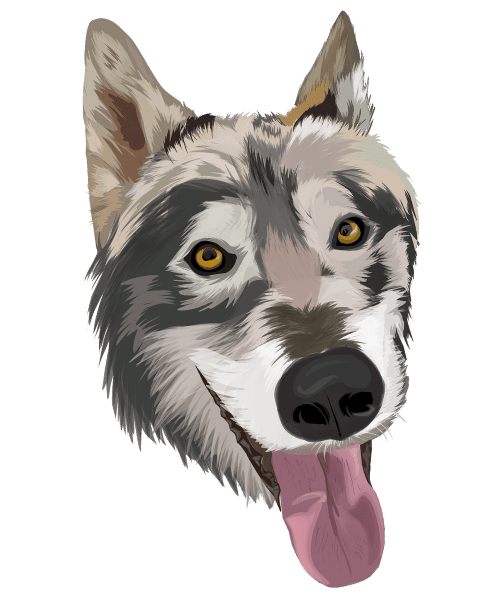
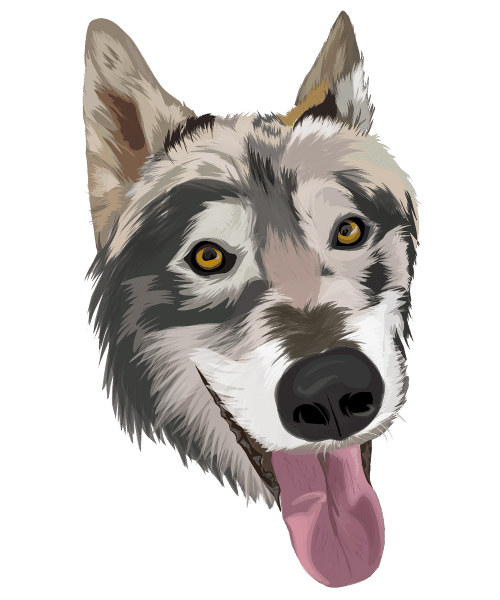
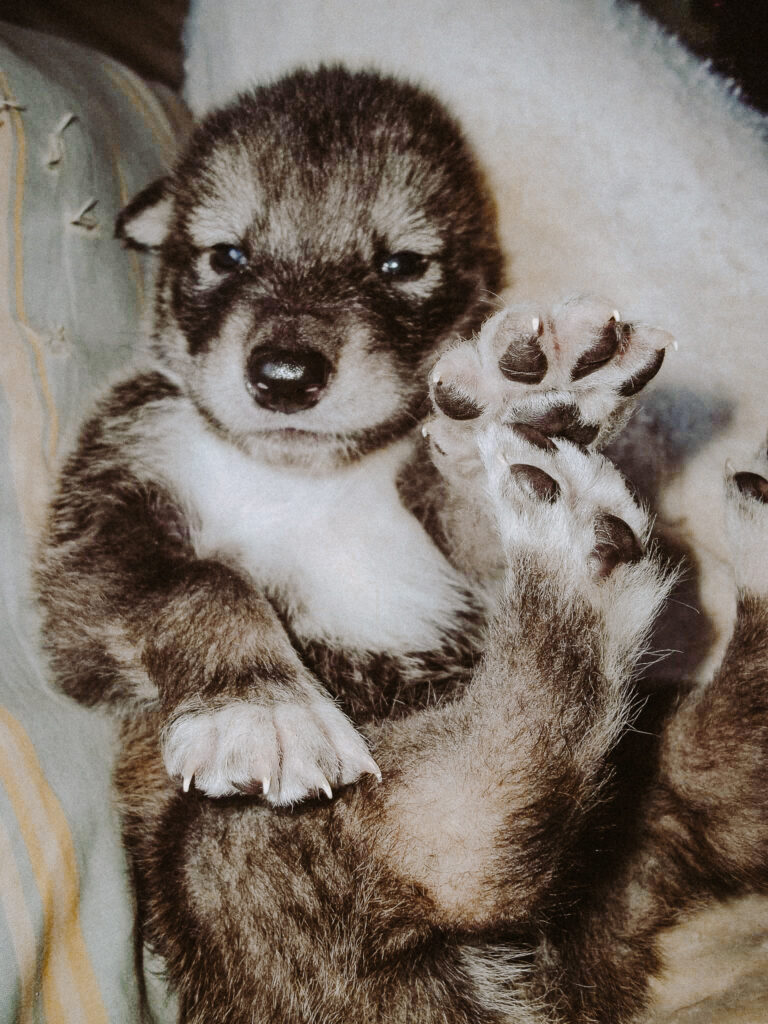
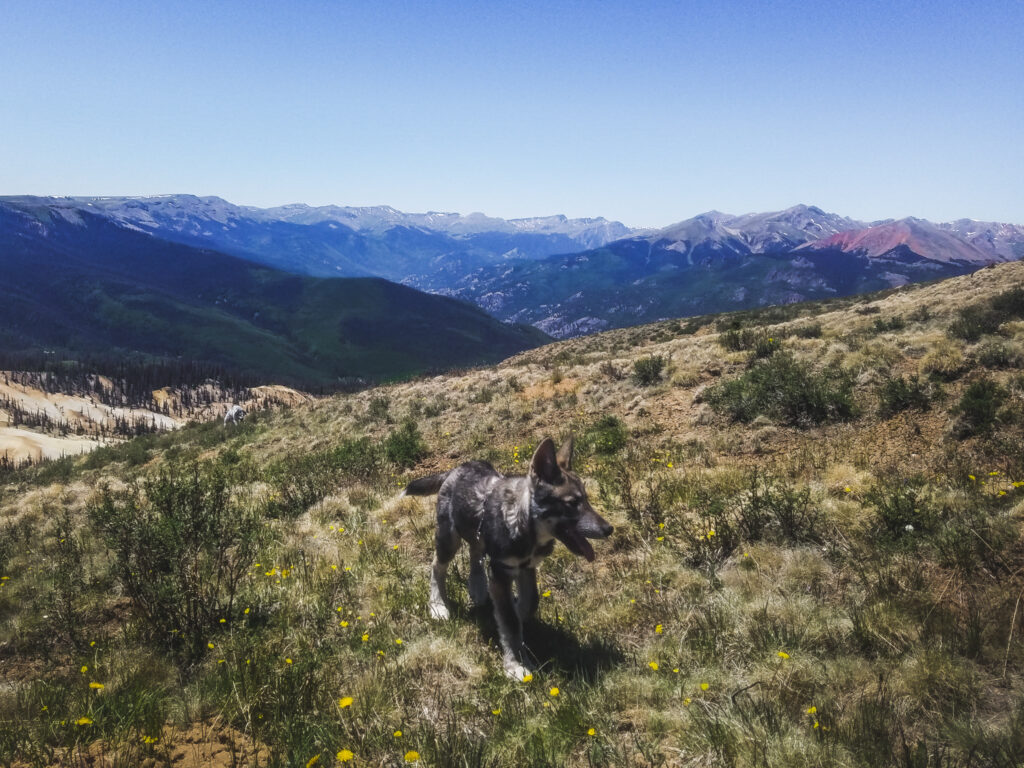
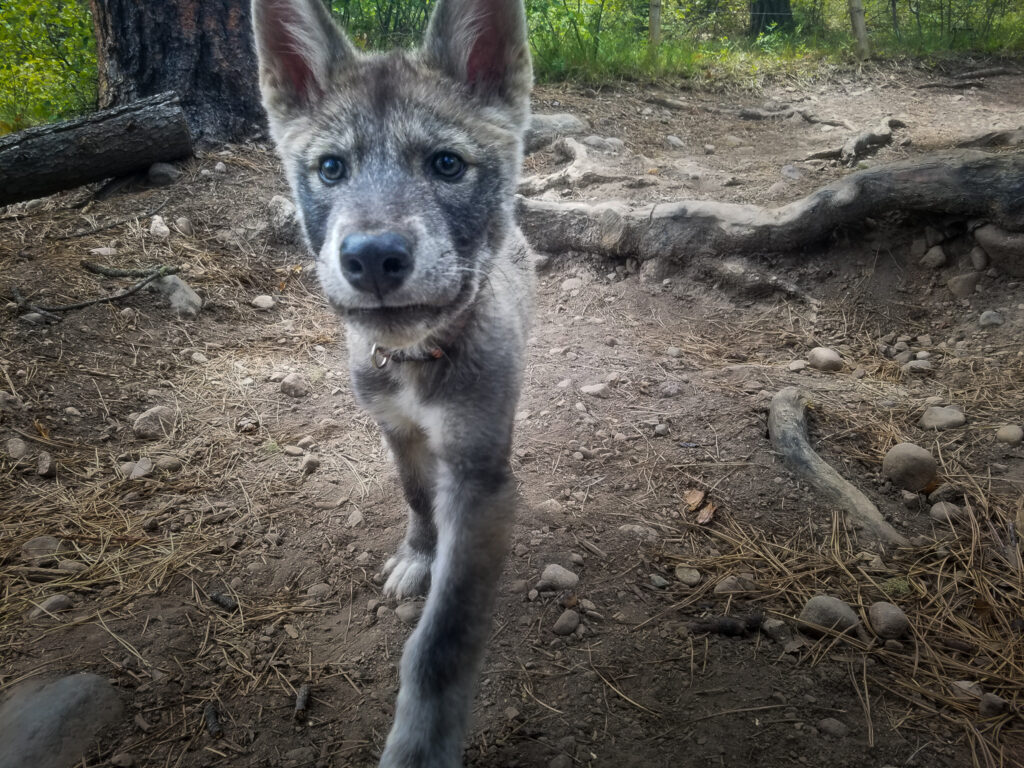
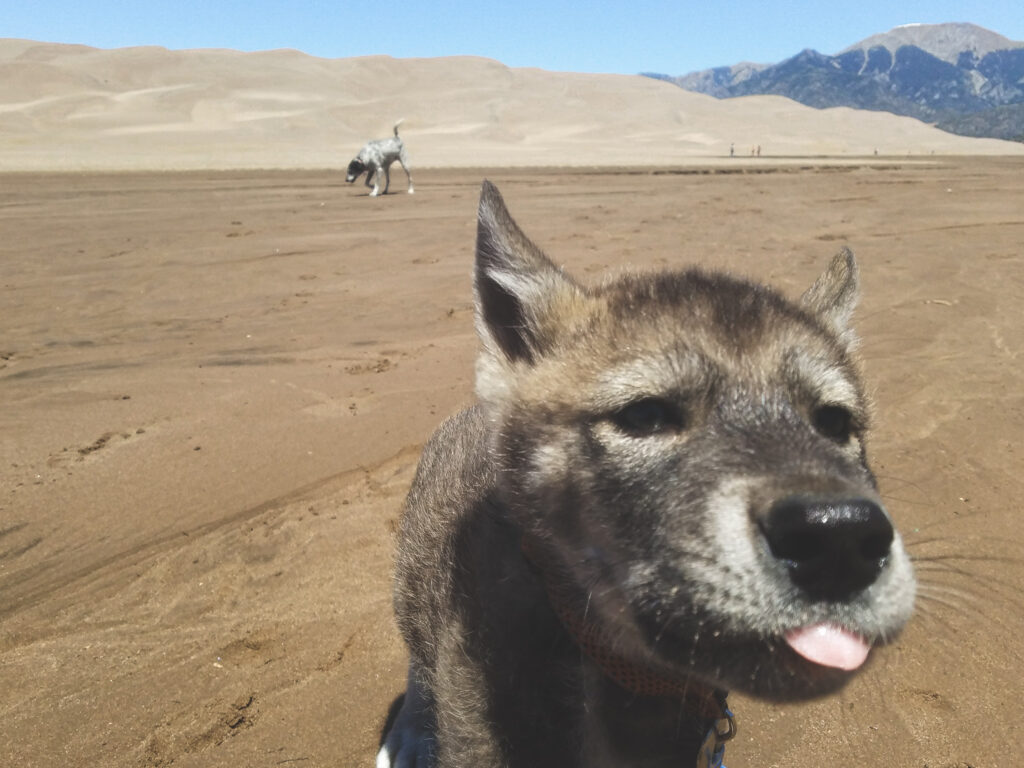
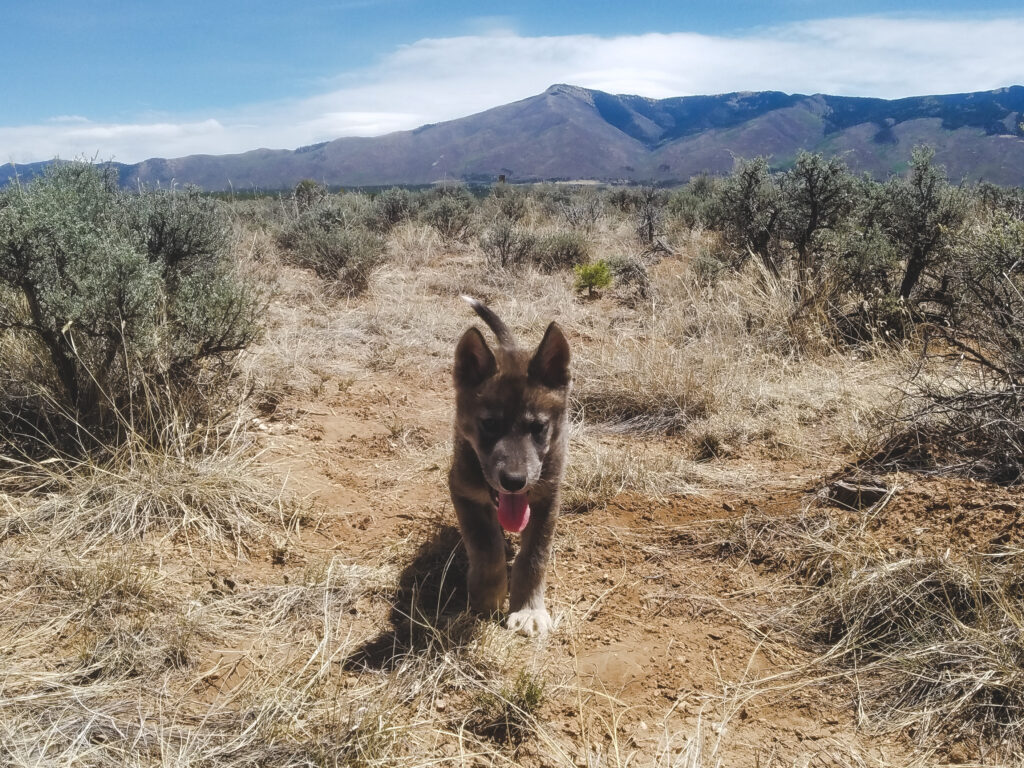
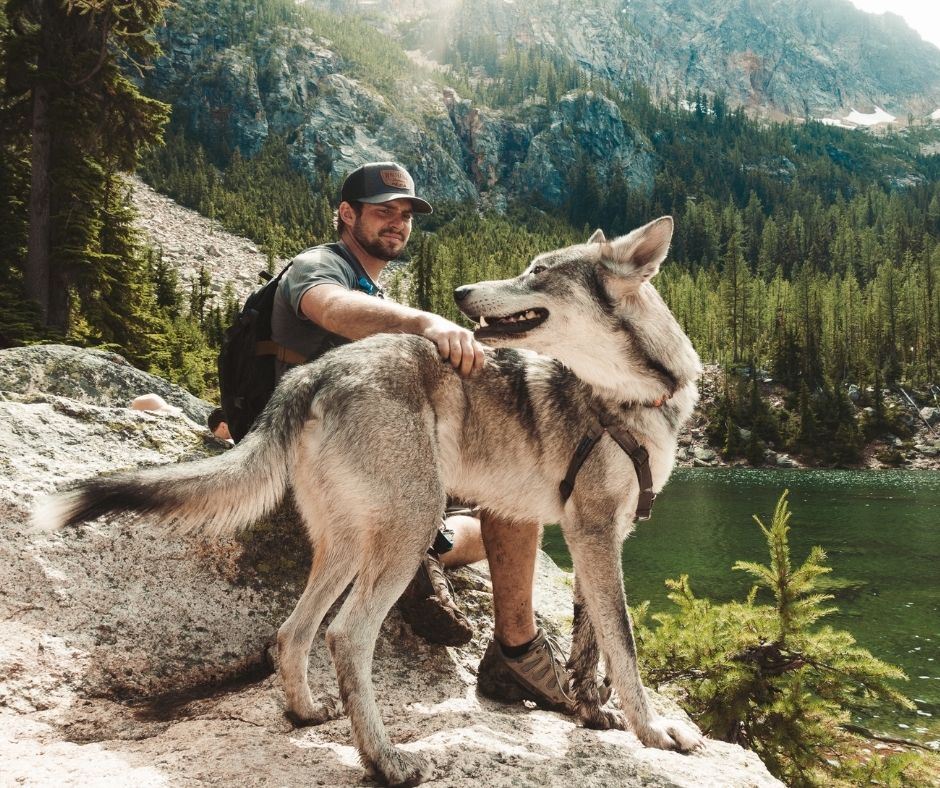
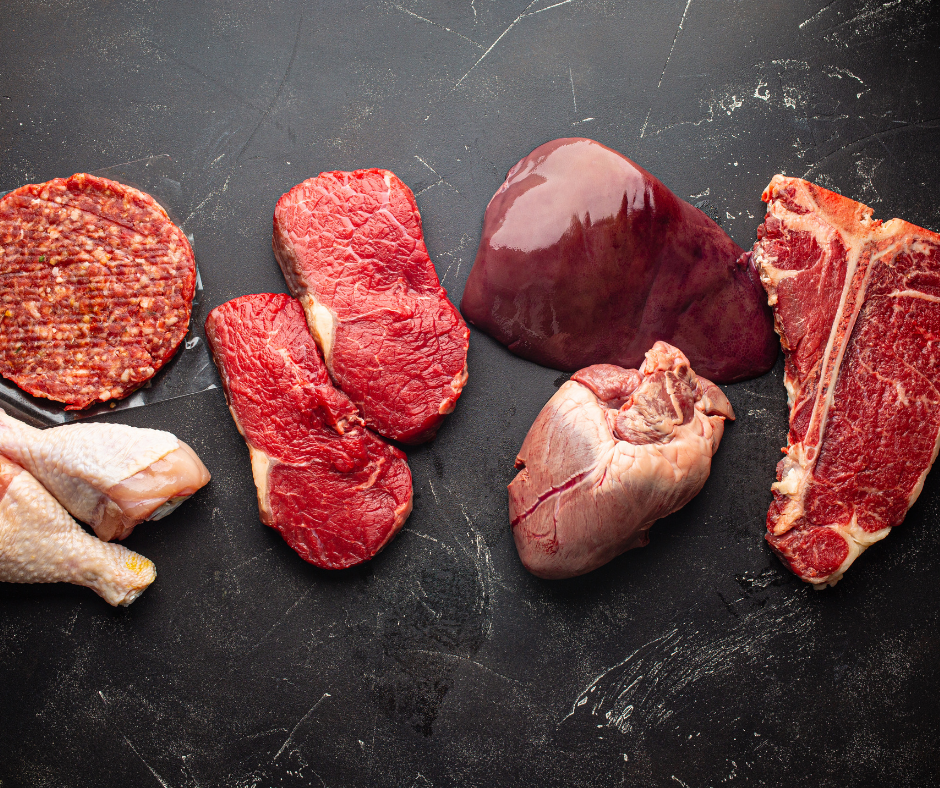
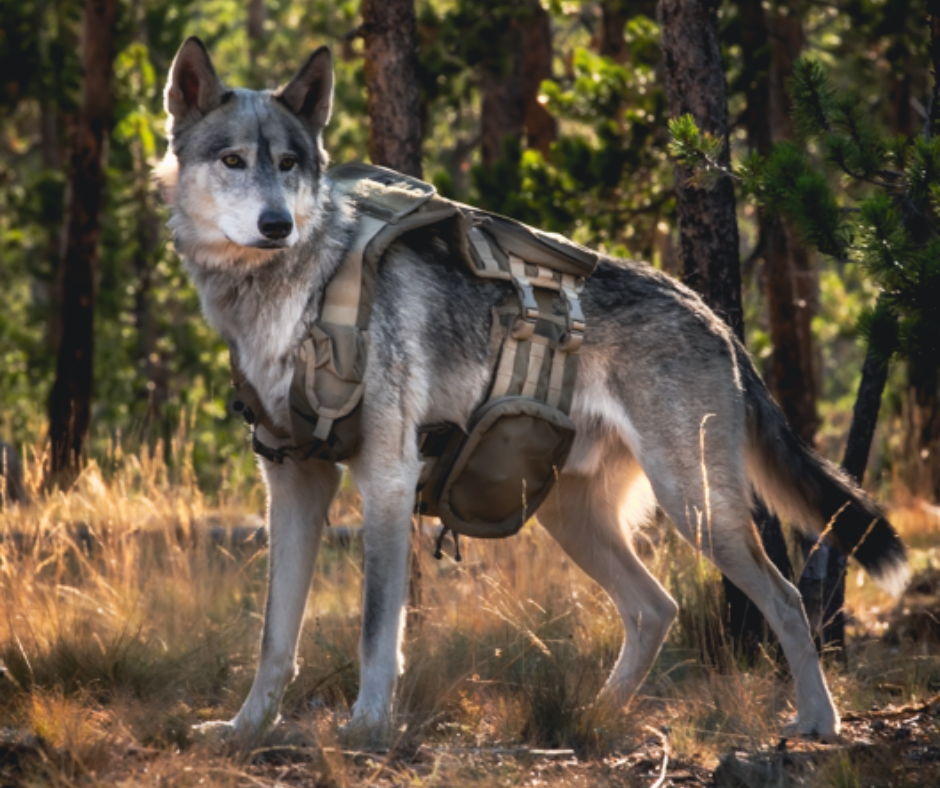
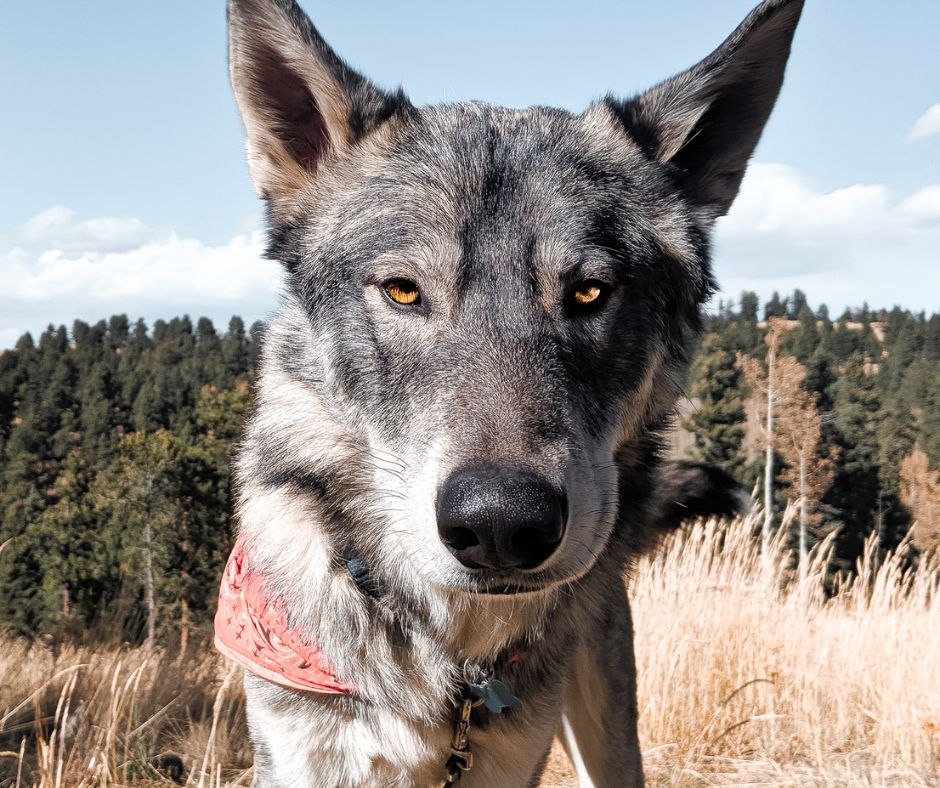
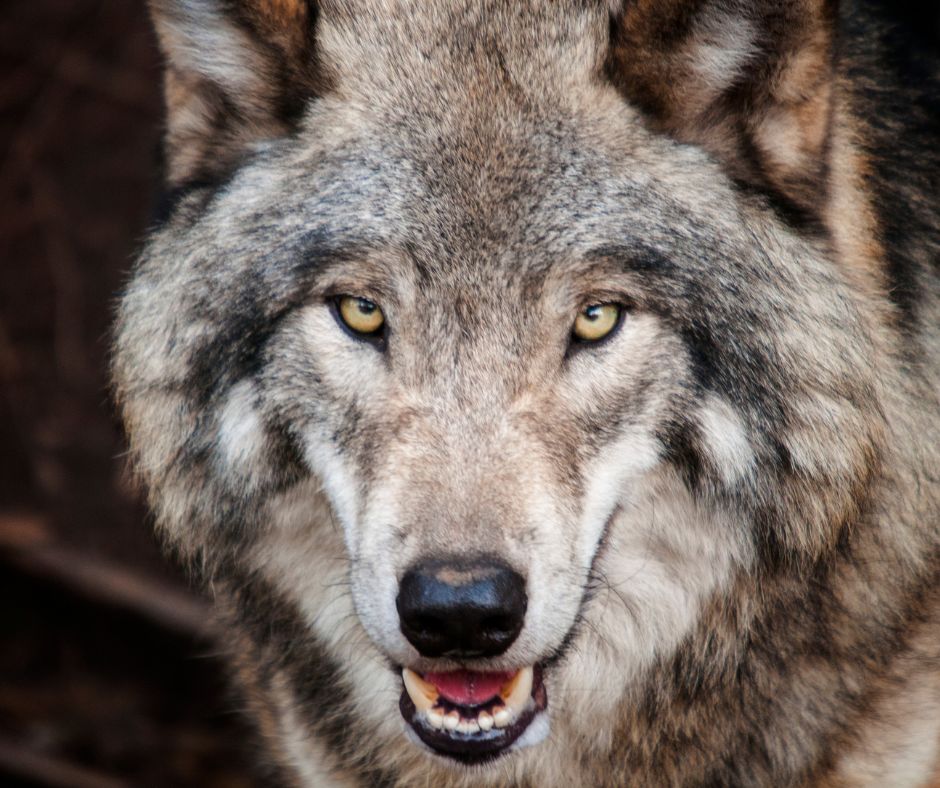
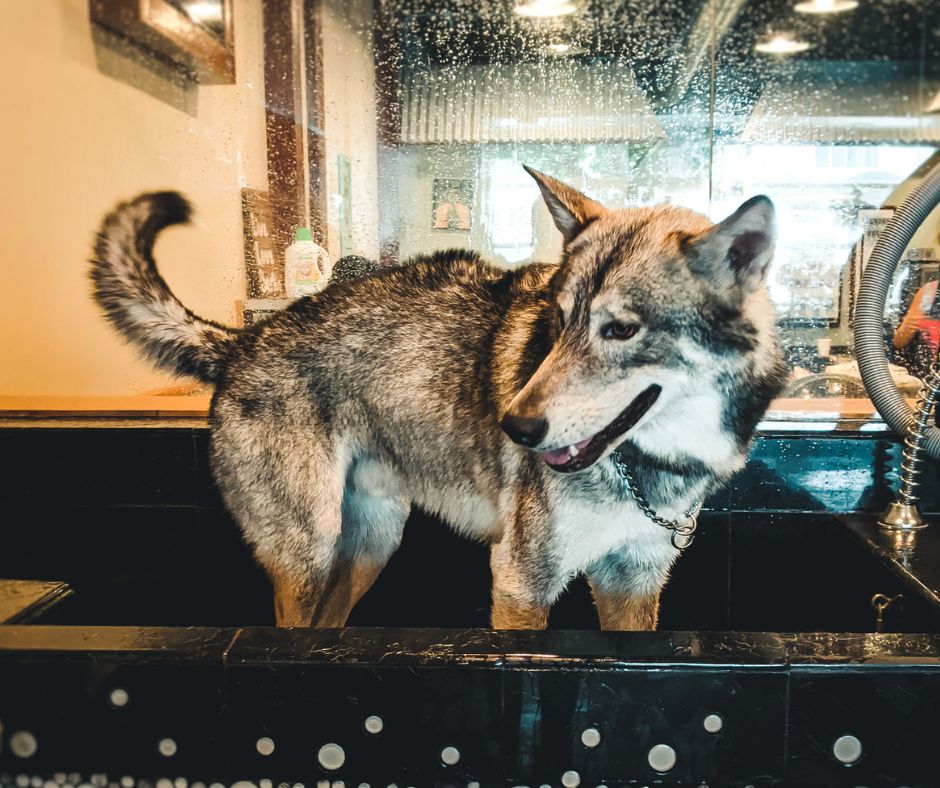
This very informative and helpful for both new and existing Wolf Hybrid owners
Hi!
any advice on training him to stop biting me. I’ve told him no, ouch, that hurts, redirected him to a toy he can bite, stopped interaction for about a minute. Sometimes he seems to get it, and other times the bites are harder. He’s only 2 months I understand he’s teething but I would really like to break him out of that habit.!
Hi Maggie! It sounds like you’re taking some great steps to address your wolfdog’s biting behavior. Two-month-old puppies, regardless of breed, do tend to bite and chew as they’re teething and exploring their world.
You’re doing great by consistently using the same word or phrase “no biting” and “ouch”, it might not seem like it right now, but eventually, your pup will start to associate it with the behavior you’re trying to discourage. Redirecting your pup to an appropriate chew toy is also a great idea.
In the past, my strategy for dealing with Cruze’s accidental biting was to turn my back on him and disengage from play while using phrases such as “no biting” or “ouch.” This approach helped him learn that rough play leads to the end of playtime.
Another technique you might try is to yelp or make a high-pitched noise (like really loud) when your wolfdog bites you. This is similar to how a littermate might react to rough play, and this can help teach your pup that biting too hard is not acceptable.
Remember to be patient and consistent with your training, and to reward your pup when he responds well. Best of luck!
Hi! I have recently adopted a wolfdog puppy here in Colorado, where I think you’re also located? He is a young male, and I’m needing to make some decisions about altering him. The rescue said to leave it until he is a year old, others have said the earlier the better to avoid a lot of testosterone that could create a problem between him and our 4yo female GSD, particularly if he decides he wants to be the alpha. I have also read that sexual maturity for wolves and wolf dogs is closer to 2-3 years, not as young a pure domestic dog. So I guess I’m wondering what your thoughts are and experiences with altering Cruze, or maybe what benefit there may be to waiting until he’s a year? Any thoughts or info would be appreciated!
Hi Natalie! We waited until Cruze was 2 years old until we neutered him. In my experience and understanding, the benefits of waiting until he was 2 include giving him more time to develop physically, which is important for larger breeds like wolf dogs. Neutering a wolf dog too early can impact their growth and development. At the time we had a 7 year old male lab pointer mix and a 3 year old female Husky, and they have always been alpha over our WD because Cruze was always the baby. Obviously, everyones experience will be different though. We went to Pagosa Veterinary Clinic since they have experience working with wolves and wolfdogs from Wolfwood Refuge in Ignacio, so we trusted that they understood how wolf dogs are sensitive to anesthesia. Hope this helps!